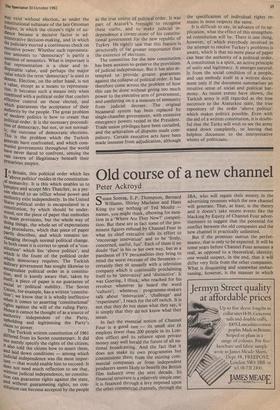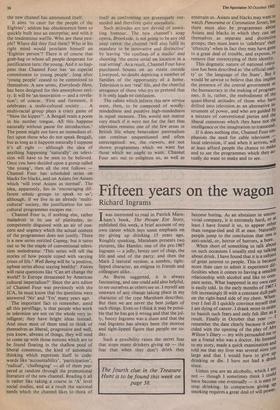Old course of a new channel
Peter Ackroyd
Susan Sontag, E.P. Thompson, Bernard Williams, Shirley Maclaine and Hans Kting (to say nothing of Ted Moult) names, you might think, elbowing for men- tion in a 'Where Are They Now?' competi- tion. But these are in fact some of the pro- minent figures enlisted by Channel Four in what its chief executive calls its effort to `encourage innovation' and to be `lively, concerned, useful, fun'. Each of them is no doubt `fun' in his or her own way, but as a pantheon of TV personalities they bring to mind the worst excesses of the Seventies -- certainly they sit uneasily with a television company which is continually proclaiming itself to be 'innovative' and 'distinctive'. It was Goering, I think, who reached for his revolver whenever he heard the word `culture'; whenever programme-makers talk about 'innovation', `challenge' and `experiment', I reach for the off switch. It is not that they do not mean what they say, it is simply that they do not know what they mean.
In fact the essential notion of Channel Four is a good one — its small size (it employs fewer than 200 people in its Lon- don office) and its reliance upon private money may well herald the future of all na- tional broadcasting. And the fact that it does not make its own programmes but commissions them from the existing com- mercial companies or from independent producers seems likely to benefit the British film industry over the next decade. Its financial structure is a relatively simple one: it is financed through a levy imposed upon the other commercial channels, through the IBA, who will regain their money in the advertising revenues which the new channel will generate. That, at least, is the theory and it doesn't take recent events like the blacking by Equity of Channel Four adver- tisements to suggest that the potential for conflict between the old companies and the new channel is practically unlimited.
But if the promises outrun the perfor- mance, that is only to be expected. It will be some years before Channel Four assumes a real, as opposed to a theoretical, identity; one would suspect, in the end, that it will differ very little from the other companies. What is disquieting and somewhat embar- rassing, however, is the manner in which the new channel has announced itself.
It aims `to cater for the people of the Eighties'; seldom has obsolescence been so quickly built into an enterprise, and with it the tendentious waffle. Who are these peo- ple? Where did they find them? Who in his right mind would proclaim himself an 'Eighties person'? There is of course that grab-bag to whom all people desperate for justification turn: the young. And it so hap- pens that Channel Four has 'an especial commitment to young people', long after 'young people' ceased to be committed to themselves. A new series, Everybody Here, has been designed for this amorphous enti- ty. It will be 'an innovation — and a revela- tion'; of course. 'First and foremost, it celebrates a multi-cultural society... A multi-racial group plays a crazy game of "blow the kipper". A Bengali reads a poem in his mother tongue. All this happens naturally without pause for introduction.' The poem might not have an immediate ef- fect upon those who do not speak Bengali, but as long as it happens naturally I suppose it's all right — although the idea of anything happening 'naturally' on televi- sion will have to be seen to be believed. Once you have decided upon a group called 'the young', then all the rest follows Channel Four has scheduled series on blacks for blacks, and on Asians for Asians which 'will treat Asians as normal'. The idea, apparently, lies in 'encouraging dif- ferent ethnic groups to speak to us'; although, if we live in an already 'multi- cultural' society, the justification for uni- cultural programmes escapes me.
Channel Four is, if nothing else, rather maladroit in its use of platitudes, in- competently disguised with an air of con- cern and urgency which the actual content of the programmes does not justify. There is a new series entitled Coping, but it turns out to be the staple of conventional televi- sion melodrama: 'This series will tell the stories of how people coped with varying crises of life.' Well Being will be 'a positive, upbeat series about staying healthy'. Voices will raise questions like 'Can art change the world? Is Europe threatened by American cultural imperialism?' Since the arts editor of Channel Four was previously with the ICA, he must know that the questions were answered 'No' and 'Yes' many years ago.
The important fact to remember, amid all this persiflage, is that people who work in television are not on the whole very in- telligent; they have bright ideas instead. And since most of them tend to think of themselves as liberal, progressive and well, you know, abreast of things, they will tend to come up with those notions which are to be found floating in the shallow pool of liberal consensus, the kind of automatic thinking which expresses itself in code- words like 'accountability', 'participation', `radical', 'challenging' — all of them pep- pered at random through the promotional literature of the new channel. Reading it all is rather like taking a course in 'A' level social studies, and as a result the national needs which the channel likes to think of itself as confronting are grotesquely out- moded and therefore quite unrealistic.
Such attitudes are not devoid of unwit- ting humour. The new channel's soap opera, Brookside, is not going to be any old soap opera: the channel 'will also fulfil its mandate to be innovative and distinctive' by leaving 'the confines of a studio' and shooting 'the entire serial on location in a real setting'. As a result, Channel Four have purchased houses on an estate outside Liverpool, no doubt depriving a number of families of the opportunity of a home. Television is not 'real' life, and the cheerful arrogance of those who try to pretend that it is only leads to confusion.
The values which inform this new service seem, then, to be composed of woolly- mindedness and putative high-mindedness in equal measure. This would not matter very much if it were not for the fact that television remains one of the few areas in British life where benevolent paternalism can continue unquestioned and often unrecognised: we, the viewers, are not shown programmes which we want but those which we ought to want. Channel Four sets out to enlighten us, as well as entertain us. Asians and blacks may want to watch Panorama or Coronation Street, but there must also be programmes about Asians and blacks in which they can see themselves as separate and distinctive groups; they must learn to 'celebrate' their 'ethnicity' when in fact they may have gone to a great deal of trouble, and expense, to remove that stereotyping of their identity: This dogmatic nature of national televi- sion has been described as 'the official reali- ty' or 'the language of the State'. But it would be unwise to believe that this implies the presence of the central government or the bureaucracy in the making of program" mes. It is, rather, the embodiment of the quasi-liberal attitudes of those who have drifted into television as an alternative in- strument of power, and who are guided by a mixture of conventional pieties and the liberal consensus which they have not the intelligence or the imagination to transcend.
If it does nothing else, Channel Four em- phasises the need for cable television --: local television, if and when it arrives, will at least afford people the chance to make and to see the programmes which they ac- tually do want to make and to see.











































 Previous page
Previous page